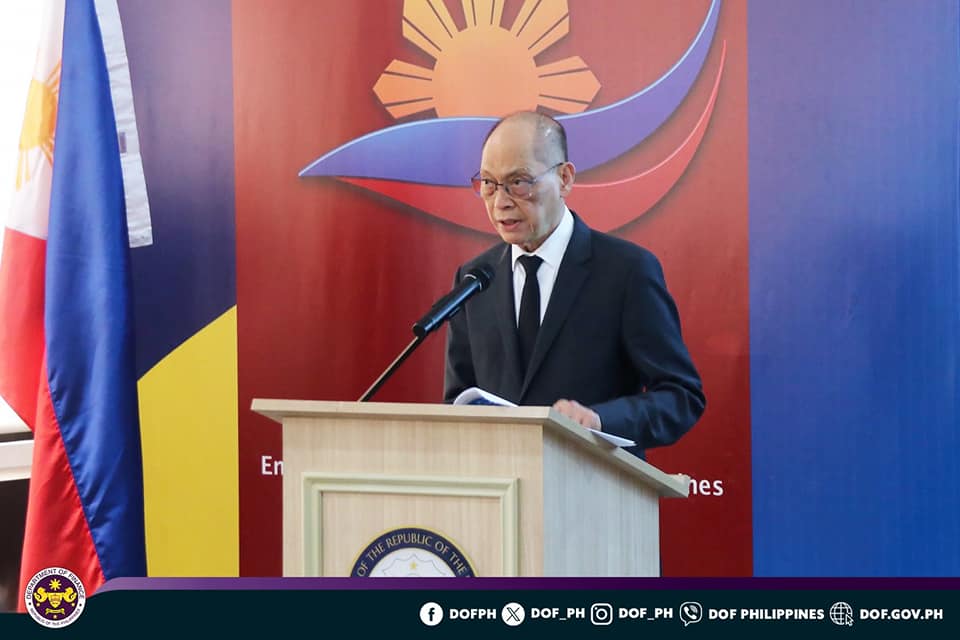Business and Economy
ASEAN ministers discuss financing modalities for health, infra

FILE: ATTRACTING INVESTORS. Finance Secretary Benjamin Diokno showcased the Philippines’ competitive investment ecosystem to the Indonesian business community during the Philippine Investment and Financial Briefing on Aug. 23, 2023 in Indonesia. The event was organized by the Philippine Embassy in Indonesia. (Photo: Department of Finance/Facebook)
In a statement late Thursday, the Department of Finance (DOF) said the meetings are part of the official activities leading up to the 10th ASEAN Finance Ministers and Central Bank Governors’ Meeting (AFMGM) to be held on Aug. 25.
With the theme, “Fostering Recovery through Strengthening Finance and Health Collaboration for Regional Health Architecture,” the AFHMM gathers Finance and Health Ministers from member countries to exchange views on the preliminary findings and recommendations of the Asian Development Bank’s (ADB) study on the National and Regional Financial Architecture for Strengthening Post-Covid 19 pandemic prevention, preparedness and response (PPR) in Southeast Asia.
The study quantified the financing gap and disparities in ASEAN countries’ resources to address the Covid-19 pandemic, exposing the varied levels of readiness of countries in the region.
The findings also cited the need for a coordinated and coherent regional strategy to recover from the pandemic and prepare for future biosecurity threats.
“We acknowledge the importance of fostering close cooperation between finance and health authorities to enhance the region’s readiness in addressing public health emergencies,” Diokno said in his intervention.
The report also identified specific approaches that governments can take, including ramping up domestic resource mobilization and investment in public health; leveraging private sector participation through public-private partnerships; strengthening the expanded Covid-19 and Other Public Health Emergencies and Emerging Diseases ASEAN Response Fund (CARF); and exploring a possible regional financial facility with the support of multilateral development banks.
“We need to ensure that the financing modality will address significant gaps in achieving the region’s PPR readiness to avoid duplication of existing international and regional mechanisms for pandemic PPR,” Diokno said.
Diokno also attended the high-level dialogue on promoting sustainable infrastructure development, which discussed the exploration of potential sources of infrastructure financing.
Panelists of the High-Level Dialogue included Indonesian Finance Minister Sri Mulyani Indrawati, Singaporean Finance Minister Lawrence Wong, Lao PDR Finance Minister Santiphab Phomvihane, Thai Finance Minister Arkhom Termpittayapaisith, Brunei Darussalam Minister of Finance and Economy Awang Haji Mohd Amin Liew Bin Abdullah, and Malaysian Deputy Finance Minister YB Tuan Steven Sim Chee Keong.
Diokno identified three strategies to produce and finance sustainable infrastructure projects which include attracting private sector capital, exploring other financing solutions including both domestic and international capital markets, and improving the mainstreaming of sustainable finance.
“To support a sustainable infrastructure financing program, the Government of Philippines intends to capitalize on private investment through the public-private partnership or PPP mechanism,” he said.
According to him, the government already made significant strides in strengthening the policy environment for PPPs and ensuring that infrastructure projects with high impact over the long term are prioritized by succeeding administrations despite Presidential term limits.
He added aims to utilize the Philippine Sustainable Finance Framework, which sets out on how the Philippines intends to raise green, social, and sustainability bonds, loans, and other debt instruments.
“The Philippines recognizes the importance of pursuing sustainable infrastructure to meet our climate ambitions and achieve resilience in the global economy. We also acknowledge that strong political will and a long-term vision are necessary to narrow the infrastructure gap and reverse our underinvestment in the sector,” Diokno said.





















